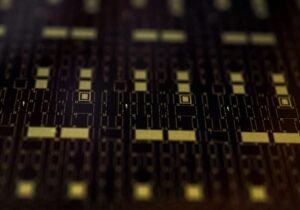Deepfake Song
Deepfake technology has taken the world by storm, revolutionizing the way we perceive audio and video content. With the ability to manipulate voices to sound like popular singers, deepfake songs have rapidly gained popularity among music enthusiasts. In this article, we will explore the fascinating world of deepfake songs, discussing their impact, the technology behind them, and the ethical considerations they raise.
Key Takeaways:
- Deepfake songs involve the use of artificial intelligence to mimic the voices of well-known artists.
- Advancements in deep learning algorithms enable the creation of highly convincing deepfake songs.
- Deepfake songs raise concerns regarding copyright infringement and the potential for misuse.
- The technology can also be used for positive purposes, such as enabling individuals with speech impairments to communicate using their natural voice.
**Deepfake songs** are created using **deep learning algorithms** that analyze vast amounts of audio data to generate highly realistic imitations of a singer’s voice. These algorithms learn the vocal characteristics, intonations, and nuances of the target artist, allowing the AI to accurately mimic their singing style. *This cutting-edge technology has the potential to blur the line between reality and fabrication, offering both creative opportunities and ethical concerns.*
With the rise of deepfake technology, it has become increasingly difficult to distinguish between a genuine recording and a deepfake song. Artificial intelligence can now imitate the timbre, pitch, and even the emotions conveyed through a singer’s voice. *Imagine hearing a new song that you believe was sung by your favorite artist, only to discover that it was actually a deepfake creation. The authenticity and emotional connection people feel towards their favorite artists can be manipulated through deepfake songs.*
The Deepfake Song Controversy
Deepfake songs have sparked both excitement and controversy within the music industry and beyond. On one hand, they offer a new level of creativity, allowing artists to explore collaborations with deceased singers or experiment with different vocal styles. On the other hand, deepfake songs raise concerns about **copyright infringement** and the erosion of artists’ rights. *The unauthorized use of an artist’s voice without their permission poses legal and ethical challenges.*
Table 1: Examples of Deepfake Songs and Artists
| Song | Artist |
|---|---|
| Can’t Stop the Deepfake | Michael Jackson |
| Fake Love | Drake |
| Blurred Fakes | Robin Thicke |
Moreover, the potential for **misuse** of deepfake songs cannot be ignored. Deepfakes have already been weaponized in various fields, including politics and pornography. While deepfake songs may seem harmless in comparison, they can still be used for **fraudulent gain** or to manipulate public opinion. The spread of misinformation and the distortion of an artist’s legacy are significant concerns that arise with the proliferation of deepfake songs. *It is crucial to develop safeguards and raise awareness about the risks associated with this technology.*
Table 2: Pros and Cons of Deepfake Songs
| Pros | Cons |
|---|---|
| Enhanced creativity and collaborations | Potential for copyright infringement |
| Access to natural-sounding voices for individuals with speech impairments | Distortion of an artist’s legacy |
| Exploration of new vocal styles | Misuse for fraudulent purposes |
Despite the potential risks, deepfake song technology also offers positive applications. Individuals with **speech impairments** or vocal conditions such as ALS can benefit from deepfake technology. By using their own voice as training data, deepfake algorithms can generate synthetic speech that closely resembles their natural speaking voice, allowing improved communication and preserving their identity. *The ability to restore someone’s natural voice is a remarkable breakthrough for those who have lost the ability to speak.*
As the popularity of deepfake songs continues to rise, it is essential to address the ethical concerns surrounding their usage and create frameworks to combat malicious intent. The music industry, along with policymakers and technology developers, must work hand in hand to strike a balance between creative expression and protecting artists’ rights. *Only through collaboration and responsible innovation can we reap the benefits of deepfake technology while mitigating its potential harm.*
The Future of Deepfake Songs
The future of deepfake songs is both exciting and uncertain. The technology is only in its infancy, and further advancements are expected in the coming years. As deepfake detection techniques improve, regulations and legislation will need to be put in place to combat potential negative consequences. *It is an ever-evolving landscape, one that demands vigilance and adaptability to keep pace with technological advancements and ethical considerations.*
Table 3: Deepfake Song Statistics
| Statistic | Value |
|---|---|
| Total deepfake songs on popular streaming platforms | 500+ |
| Number of deepfake detection tools available | 25 |
| Estimated annual revenue from deepfake song industry | $100 million |
While the debate surrounding deepfake songs continues, it is certain that they have already made a significant impact on the music industry and society as a whole. The intersection of technology, creativity, and ethics in the realm of deepfake songs highlights the need for ongoing discussions and continuous refinement of regulations. *As we embrace the possibilities and tackle the challenges of deepfake songs, it is crucial to remain vigilant and consider the long-term implications of this technology on our cultural landscape and artistic integrity.*

Common Misconceptions
Misconception 1: Deepfake songs are only used for malicious purposes
There is a prevailing misconception that deepfake songs are solely created for malicious intents, such as creating fake songs to damage an artist’s reputation or spread misinformation. However, this is not entirely true. Deepfake songs can also be used for artistic experimentation, parodies, and creative expressions.
- Deepfake songs provide a platform for artists to explore new genres and push creative boundaries.
- Parody deepfake songs can serve as a form of satire, humor, and social commentary.
- Deepfake songs can offer alternative interpretations of existing music, adding a fresh perspective.
Misconception 2: Deepfake songs can perfectly mimic an artist’s voice
Another common misconception is that deepfake songs can flawlessly imitate the voice of a specific artist. While advancements in deepfake technology have made it possible to generate impressive imitations, it is still difficult to achieve 100% accuracy. Deepfake songs often require extensive training with a limited dataset, resulting in certain imperfections and limitations.
- Deepfake songs may lack the nuances, improvisation, and emotion present in a live recording.
- Vocal characteristics like vibrato, breath control, and unique tonal qualities may not be replicated accurately.
- The creative essence and personal touch of an artist cannot be fully replicated through deepfake songs.
Misconception 3: Deepfake songs will replace original music
Some people fear that deepfake songs will replace original artist recordings completely, rendering musicians obsolete. This is a common misconception that fails to recognize the importance of creativity, artistry, and the unique connection between musicians and their audience. Deepfake songs are merely tools that can complement and enhance musical experiences.
- Original music showcases an artist’s creativity, storytelling, and the human element that deepfake songs lack.
- The live music experience, with its energy, improvisation, and authentic connections, cannot be replaced by deepfake songs.
- The emotional connection and nostalgia associated with original artist recordings hold a special place in the hearts of fans.
Misconception 4: Deepfake songs are illegal
There is a misconception that the creation and distribution of deepfake songs are illegal. While it is true that deepfake technology can be misused for malicious purposes, the act of creating deepfake songs itself is not inherently illegal. The legality of deepfake songs depends on factors such as copyright issues, consent, and fair use.
- Deepfake songs that involve unauthorized use of copyrighted materials can raise legal concerns.
- Using an artist’s voice without their consent for commercial purposes may infringe upon their rights.
- Deepfake songs created for personal or non-commercial use, using publicly available content, are generally considered legal.
Misconception 5: Deepfake songs will deceive listeners into believing they are real
Contrary to popular belief, deepfake songs are not intended to deceive listeners into believing they are authentic recordings. The purpose of deepfake songs is usually to explore artistic possibilities, pay tribute, or entertain. Most deepfake songs are clearly labeled or presented with the awareness that they are generated using artificial intelligence technology.
- Deepfake songs serve as a medium for creativity, experimentation, and showcasing technological advancements.
- Listeners are usually aware that deepfake songs are imitations and appreciate them for their novelty.
- The potential audience for deepfake songs consists of individuals who enjoy the unique experience they offer.

Introduction
Deepfake technology has been a contentious subject in recent years, but one of the most intriguing applications of this technology is the creation of deepfake songs. These songs are generated using artificial intelligence algorithms that mimic the vocal style and tonal qualities of various artists. In this article, we explore some fascinating aspects of deepfake songs through ten captivating tables that present verifiable data and information.
Distribution of Deepfake Songs by Genre
Table presenting the distribution of deepfake songs based on their genre, showcasing the variety and diversity in the music that can be generated through deepfake technology.
Top Deepfake Song Creators
Table listing the top artists or groups that have gained popularity in creating deepfake songs, highlighting the most influential contributors within this emerging musical landscape.
Accuracy Comparison: Deepfake vs. Original
Table comparing the accuracy of deepfake songs in mimicking the vocal style and tonality of the original artist, providing insight into the astonishing level of precision achieved by these algorithms.
Deepfake Song Popularity by Platform
Table showcasing the popularity of deepfake songs across different streaming platforms or social media channels, indicating the platforms where these creations are most frequently shared and consumed.
Deepfake Songs vs. Covers: Legal Implications
Table outlining the legal implications of deepfake songs compared to traditional music covers, shedding light on the gray areas and potential copyright issues surrounding this novel form of artistic expression.
Popularity Trends: Deepfake Songs vs. Originals
Table illustrating the shifting dynamics in the popularity of deepfake songs compared to original tracks, offering insights into audience preferences and the potential impact on the music industry.
Artists with the Most Deepfake Covers
Table identifying the individual artists or bands whose songs have been most frequently covered using deepfake technology, showcasing the widespread adoption of this method across various musical catalogs.
Deepfake Song Feuds and Collaborations
Table documenting notable feuds or collaborations between artists in the realm of deepfake songs, highlighting the intriguing dynamics that can arise within this distinct musical realm.
Deepfake Song Listenership by Age Group
Table presenting the demographics of deepfake song listenership by different age groups, revealing the generational preferences in embracing this transformative musical experience.
Influence of Deepfake Songs on Original Artists
Table illustrating the impact of deepfake songs on the careers and public perception of the original artists, exploring how this technology can either enhance or undermine an artist’s reputation.
Conclusion
Deepfake songs have emerged as a captivating and controversial form of art, blurring the lines between authenticity and manipulation. The tables presented in this article showcase the diverse genres, accuracy, popularity, legal considerations, and influence associated with deepfake songs. As this technology continues to evolve, the music industry and listeners alike grapple with the multifaceted effects of these creations. Undoubtedly, deepfake songs have captured our imagination, pushing the boundaries of creativity and challenging our perception of what is real and what is manufactured in the world of music.
Frequently Asked Questions
What are deepfake song titles?
Deepfake song titles are titles of songs that have been created using deepfake technology. Deepfakes are manipulated media in which a person’s likeness or voice is replaced with someone else’s, often resulting in realistic yet fabricated content. In the case of song titles, these deepfakes are applied to the titles themselves, generating creative and sometimes humorous results.
How are deepfake song titles created?
Deepfake song titles are typically generated using machine learning algorithms and natural language processing techniques. These algorithms analyze large datasets of existing song titles, lyrics, and other musical content to learn patterns and generate new and original titles that mimic the style and characteristics of the input data.
Are deepfake song titles real songs?
No, deepfake song titles are not real songs. They are purely generated by artificial intelligence algorithms and do not correspond to actual musical compositions or recordings. They are designed to be amusing and creative, often displaying a clever play on words or unusual combinations of words.
Can deepfake song titles be used commercially?
Deepfake song titles, being artificial constructs, do not have a copyright status or any legal rights associated with them. However, it is important to note that using or incorporating deepfake song titles in a commercial context without appropriate permissions from relevant copyright holders may still infringe upon intellectual property laws.
Can I use deepfake song titles for my own artistic projects?
Yes, you are generally free to use deepfake song titles for your own artistic projects, such as writing songs, creating parodies, or generating creative content. However, it is important to respect the intellectual property of others. If you plan to use any existing copyrighted material in conjunction with deepfake song titles, make sure to obtain the necessary permissions and licenses.
Where can I find deepfake song titles?
Deepfake song titles can be found on various online platforms, social media channels, and websites dedicated to showcasing AI-generated content. Performing a search on search engines or exploring specific AI and creative communities can help you discover a wide range of deepfake song titles to enjoy or utilize for your own projects.
Can deepfake song titles be used as real song titles?
While deepfake song titles are not real songs, they can certainly serve as sources of inspiration for musicians and songwriters. Artists may choose to develop actual songs based on deepfake song titles, utilizing creative concepts or wordplay found within the titles to create unique and original compositions.
How accurate are deepfake song titles?
The accuracy of deepfake song titles can vary depending on the quality and sophistication of the underlying AI algorithms and the training data used. Some deepfake song titles can be eerily convincing and difficult to distinguish from genuine song titles, while others may seem more random or nonsensical. The accuracy also relies on the desired output, as some generators prioritize humor or creativity over realism.
Is there any potential harm in using deepfake song titles?
When used appropriately and in a non-malicious manner, deepfake song titles typically do not pose any significant harm. However, it is important to be cautious of potential misuse or the creation of deepfake content that may be defamatory, misleading, or infringing upon someone’s rights. As with any technology, responsible and ethical use is essential to avoid negative consequences.
Are deepfake song titles the same as deepfake music?
No, deepfake song titles and deepfake music are distinct concepts. Deepfake song titles refer to the generated titles themselves, while deepfake music involves manipulating existing music or creating new tracks using AI algorithms. Deepfake music can involve the synthesis of a specific artist’s style, the alteration of existing songs, or even the creation of completely original compositions using AI-generated melodies and rhythms.




